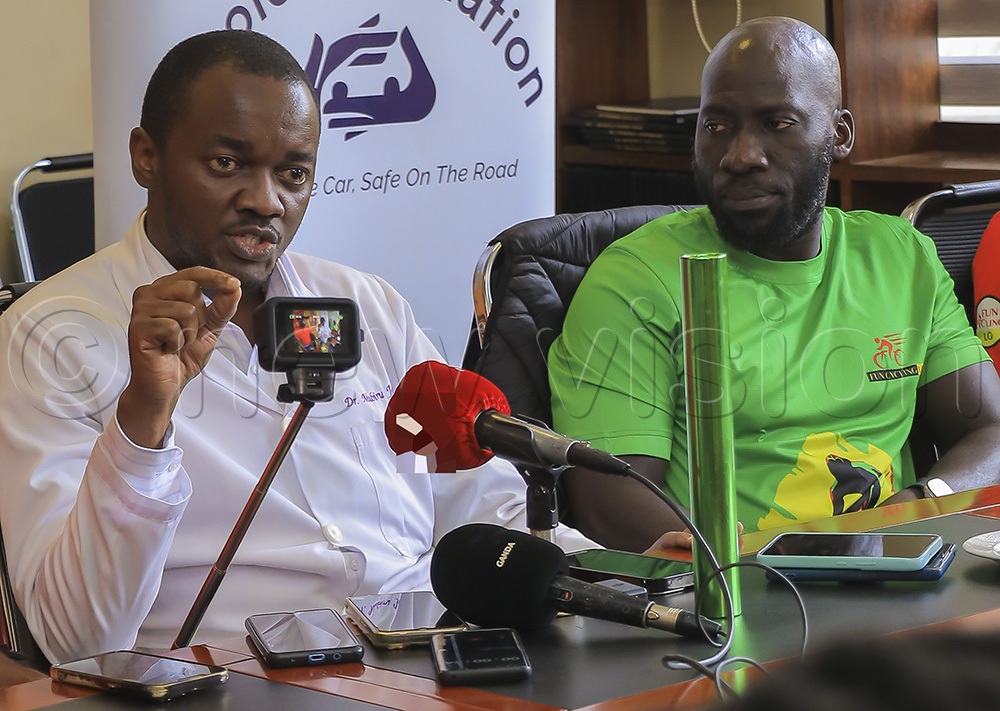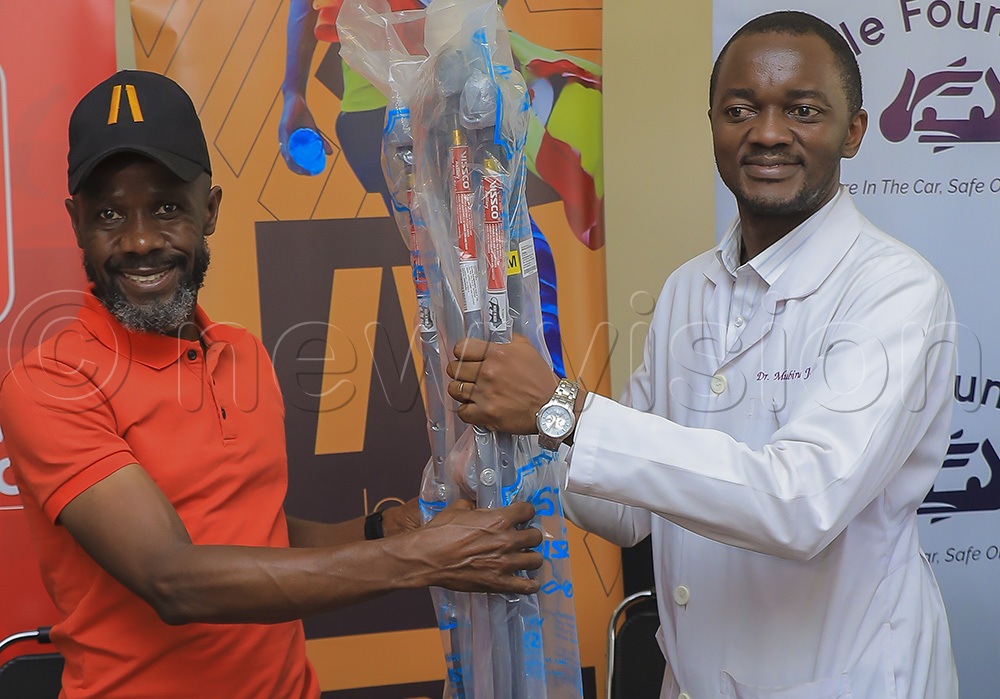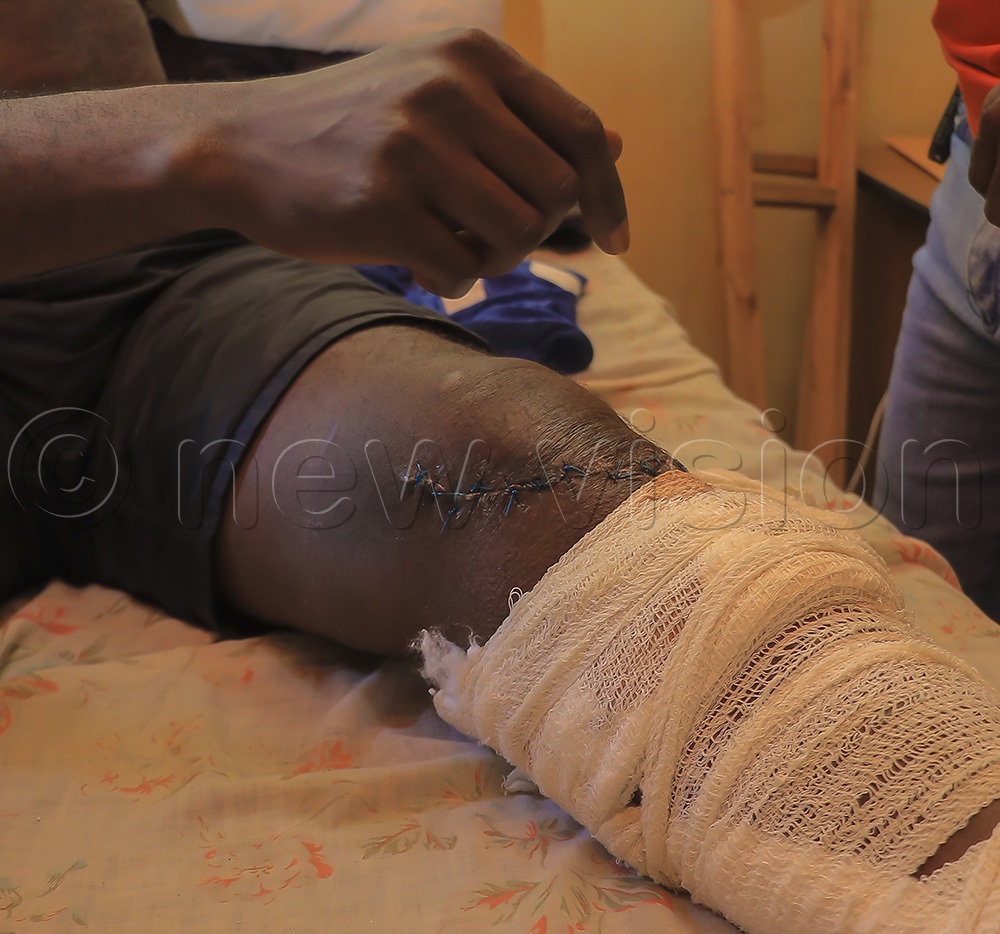Road safety advocates donate to Mulago road crash victims, walk 60km for safer roads
“This year’s relay will be held in commemoration of UN Global Road Safety Week, uniting individuals, families, institutions, and corporate partners in a symbolic journey of remembrance and advocacy,” Beyanga remarked.
(L-R) Road safety advocate Joseph Beyanga, also known as Joe Walker, Judith Karari, a senior road safety officers from the works and transport ministry, Dr Joseph Mubiru, an Associate Consultant Orthopedic Surgery, and Head of Orthopedics, at accident and emergency Mulago Hospital, and journalist Ben Mwine during the launch of the ‘Joe Walker Remembrance Relay 2025’ at Mulago National Referral Hospital in Kampala on Tuesday November 4, 2025. (Credit: Douglas Mubiru)
Dr Mubiru (L) said that about 8% to 10% of the very sick arising from bloody road traffic accidents die in the next 3-5 minutes as soon as they arrive at Mulago for treatment, insisting on how terrible and costly road crashes are to the country. (Credit: Douglas Mubiru) Beyanga hands over some of the clutches donated to road crash victims at Mulago National Referral Hospital to Dr Mubiru. (Credit: Douglas Mubiru) Dr Joseph Mubiru of Mulago National Referral Hospital receives some of the wheel chairs from Beyanga. The wheel chairs were donated by the Joe Walker Foundation to Mulago Hospital road crash victims. (Credit: Douglas Mubiru) Some of the road crash victims still under under the care of Mulago Hospital.
KAMPALA - Mulago National Referral Hospital, on average, receives about 800 trauma cases each month, arising from road crashes.
“The cost of treating a critically ill patient per day without surgery will come about sh3.5m per day, and that is either shared with in the patient and government, depending on the availability of resources or rather the patient might end up taking up the burden,” said Dr Joseph Mubiru, an Associate Consultant Orthopedic Surgery, and Head of Orthopedics, at accident and emergency Mulago Hospital
Mubiru said that about 8% to 10% of the very sick arising from bloody road traffic accidents die in the next 3-5 minutes as soon as they arrive at Mulago for treatment, insisting on how terrible and costly road crashes are to the country.
He made the remarks on Tuesday, November 4, 2025, at Mulago National Referral Hospital in Kampala as road safety advocate Joseph Beyanga, also known as Joe Walker of Joe Walker Foundation, launched the ‘Joe Walker Remembrance Relay 2025’ aimed at “walking to remember, walking for safer roads.”
The 2025 60km relay walk is scheduled for November 15, 2025, beginning at Sheraton Kampala Hotel.
Many road crash victims saved
However, Dr Mubiru stressed that many road crash victims are saved, but the impact is that they remain in hospitals for a long time, meaning they are unable to earn a living, and their livelihoods are lost.
“50 to 65% of the casualties are men and, in our society, the most productive portion of the population. Most of them are between 18 and 45 years, so we are losing a very productive generation of labour force through road traffic accidents,” calling for more awareness and safety campaigns against reckless driving and riding by road users.
Walking to remember, walking for safer roads
In his remarks, road safety advocate Beyanga said the Joe Walker Remembrance Relay 2025 returns this year as a powerful call to action for safer roads, deeper reflection, and collective responsibility.
“This year’s relay will be held in commemoration of UN Global Road Safety Week, uniting individuals, families, institutions, and corporate partners in a symbolic journey of remembrance and advocacy,” Beyanga remarked.
He stressed, “Every day, Uganda loses an average of 14 people to road crashes, with many more left injured or permanently disabled. These are not just statistics; they are mothers, fathers, children, and friends whose lives are cut short on roads that should lead them safely home. The Joe Walker Remembrance Relay transforms these painful numbers into purpose by bringing communities together to remember, reflect, and act.”
He invited corporate organisations, schools, and community groups to form teams that carry the message of road safety across designated stages of the route, insisting that the event emphasises unity, empathy, and shared commitment to reducing road crashes, aligning with the UN’s theme of “Advancing Sustainable Transport for All.”
This year’s relay is in partnership with Nicole Foundation, Ministry of Works and Transport, Sheraton Hotel, Fun Cycling and the Orthopedic Society of Uganda.
Donation to Mulago road crash victims
The Joe Walker Foundation also donated wheelchairs, clutches, crepe bandages, Iodine for cleaning up wounds, and surgical spirits, among others, to Mulago Hospital accident victims, and Dr Mubiru received the donations on behalf of the Hospital to be given to several victims currently under treatment.
“Participants are, however, invited to make a voluntary contribution of UGX 20,000, which will go toward purchasing basic supplies and care materials for road crash victims admitted at Mulago Hospital,” urged Beyanga.
The relay
According to Beyanga, teams can consist of 6 members each covering 10KM, or 3 members each covering 20KM, with every participant walking their segment before passing the baton to the next teammate.
One team captain will register all members, and participation is strictly by walking. The relay format powerfully symbolises collective responsibility, showing that road safety is a shared journey where everyone plays a part.
By walking in teams, passing the baton, and supporting one another along the route, participants demonstrate that creating safer roads requires cooperation, awareness, and mutual accountability.